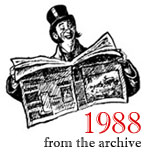
On Ecumenism & the Amazing Unity of Catholics
GUEST COLUMN
Having been a priest in what was then called The Protestant Episcopal Church in the United States of America, I became a Roman Catholic, together with my wife, in 1949. Pius XII was pope; the Mass was in Latin; and we had three small children.
Now, almost 40 years later, we have survived Vatican II; the Mass is in very pedestrian English; and we share the life of the Church with Pope John Paul II, some very angry American women, Hans Küng, and The Wanderer. We have seven adult offspring, a dozen grandchildren, and I have been an ordained married Catholic priest since 1983, under a most unexpected Pastoral Provision which permits such things to happen.
I do marvel at the wonders of the Providence of God, and I still have happy memories of His graces given to me in the Episcopal Church through the Anglo-Catholic movement. After all, as Ronald Knox liked to say, no one can really hate the Church of England. But while one has mostly quite pleasant, and often funny, recollections of living in the Protestant Episcopal Church while, at the same time, trying to be an Anglo-Catholic, one does indeed thank God to be out of it, and in communion with the contentious, and sometimes vulgar, family known as The People of God or The Body of Christ presided over by Peter’s Vicar.
I would like to assure any stray Episcopalians who may be considering joining the growing numbers “going to Rome” that it is well worth the trip, which may seem to be short but is really at least 2,000 miles. Those who move from the fairly recent construction known as the Anglican Communion back to The Old Homestead on the Tiber should know that the sometimes strident squabbles in the old place do not in any way impair the claim that the Catholic Church presided over by the Bishop of Rome is the historic mainstream of Christianity, the authentic and indispensable center of faith, order, and unity for all Christians, as was reaffirmed by Vatican II.
You May Also Enjoy
This year commemorates the bicentennial of the birth of St. Vincent Pallotti, under whose patronage…
Newman rejects the notion that the "other" world does not exist at this present moment, but begins after death: "No: it exists now, though we see it not."
How much of Chinese daily and intellectual life, so utterly foreign to men from both Athens and Jerusalem, can be carried over into communion with Rome?

